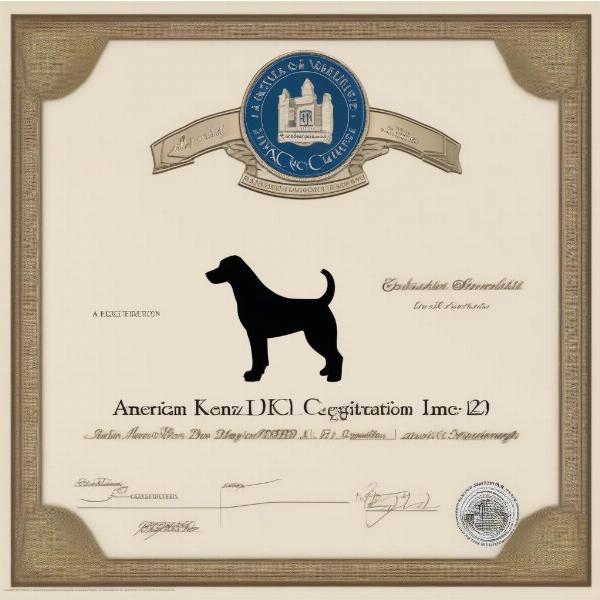A birth certificate for a dog isn’t quite the same as a human birth certificate. While it doesn’t legally prove parentage in the same way, it acts as a vital record, especially for purebred dogs. It details the dog’s lineage, confirming its breed and often including information about its parents, grandparents, and sometimes even further back. This document can be crucial for breeders, show dog owners, and anyone interested in their dog’s heritage. Understanding what a dog birth certificate is and its significance can be incredibly helpful for both current and prospective dog owners.
Understanding a Canine “Birth Certificate”
What many people refer to as a dog’s birth certificate is actually a registration certificate issued by a kennel club. The most well-known kennel clubs include the American Kennel Club (AKC), the United Kennel Club (UKC), and The Kennel Club (UK). These certificates are only available for purebred dogs whose parents are also registered with the same kennel club. It signifies that the dog’s lineage meets the breed standards set by the specific organization. This documentation is particularly important for those interested in dog shows, breeding programs, or simply having a documented history of their dog’s ancestry.
 AKC dog registration certificate
AKC dog registration certificate
Why a Dog Birth Certificate (Registration Certificate) is Important
A registration certificate serves multiple purposes. For breeders, it’s essential for maintaining breed standards and ensuring the health and well-being of future generations. It helps track lineages, avoid inbreeding, and identify potential genetic health risks. For show dog owners, the registration certificate is a mandatory requirement for participating in conformation shows. It verifies the dog’s pedigree and eligibility to compete.
Proof of Pedigree
The primary function of a dog’s registration certificate is to verify its pedigree. It confirms the dog belongs to a specific breed and traces its ancestry back several generations. This detailed lineage can be invaluable for understanding potential breed-specific traits, both physical and behavioral.
Breeding Purposes
For responsible breeders, registration certificates are indispensable. They allow for careful selection of breeding pairs, minimizing the risk of genetic diseases and maintaining the desired breed characteristics. By studying the pedigrees of potential breeding partners, breeders can make informed decisions that promote the health and well-being of the puppies.
Show Dog Eligibility
Participating in conformation shows requires proof of pedigree, and the registration certificate provides this vital documentation. Without it, a dog cannot compete in AKC, UKC, or other kennel club recognized events.
What Information is Included on a Dog Registration Certificate?
A typical registration certificate will include:
- Registered Name: This is the official name of the dog registered with the kennel club.
- Breed: The specific breed of the dog.
- Date of Birth: The dog’s birthday.
- Sex: Male or female.
- Color and Markings: A detailed description of the dog’s coat.
- Registered Names and Numbers of Parents: The official names and registration numbers of both parents.
- Registration Number: A unique number assigned to the dog by the kennel club.
Is a “Birth Certificate” Necessary for All Dogs?
While a registration certificate (often called a birth certificate) is vital for certain activities like showing and breeding, it’s not essential for every dog owner. For mixed-breed dogs, or “mutts,” such a certificate isn’t available. If you’re not planning on showing or breeding your dog, and you adopted from a shelter or rescue, a registration certificate might not be necessary. The most important thing is the love and care you provide for your furry companion.
Conclusion
A dog’s “birth certificate,” more accurately a registration certificate, is a valuable document for purebred dogs, particularly for those involved in breeding or showing. It provides proof of pedigree, facilitates responsible breeding practices, and allows participation in conformation events. While not essential for all dog owners, understanding its significance can be beneficial for anyone interested in their dog’s heritage. If you have further questions about birth certificates for dogs, consulting with a breeder or a reputable kennel club can provide additional clarity.
FAQ
- Do mixed-breed dogs have birth certificates? No, registration certificates are only available for purebred dogs with registered parents.
- How do I get a birth certificate for my dog? You’ll need to contact the kennel club where the dog is registered, such as the AKC or UKC.
- Can I register my dog after I get it? It depends. If the breeder hasn’t already done so, and the parents are registered, you may be able to register the litter. Contact the relevant kennel club for specific requirements.
- What if I lose my dog’s registration certificate? Contact the issuing kennel club for information on obtaining a replacement.
- Is a registration certificate the same as proof of ownership? No, a registration certificate verifies the dog’s breed and lineage, but it doesn’t necessarily prove ownership. Other documents, such as adoption papers or sales contracts, usually serve as proof of ownership.
- Is microchipping information included on a birth certificate? No, microchip information is typically stored in a separate database.
- Can I breed my dog without a registration certificate? You can, but it’s not considered responsible breeding practice. Registering dogs ensures adherence to breed standards and helps prevent genetic health issues.
ILM Dog is your trusted international resource for everything dog-related. Whether you’re looking for advice on dog breeds, health care, training, or nutrition, our expert content covers every aspect of dog ownership. We’re dedicated to providing practical, reliable information for dog lovers worldwide. Contact us at [email protected] or +44 20-3965-8624 for more information. ILM Dog understands the bond between humans and their canine companions and is here to help you navigate every step of your dog ownership journey.